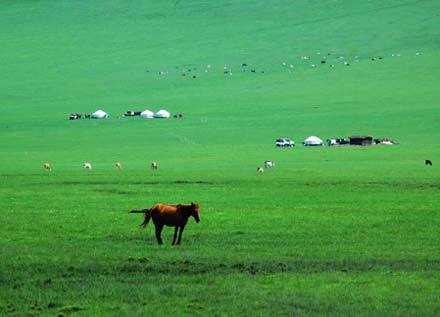The Xinjiang Uygur autonomous region is continuing with efforts to save the Bayanbulak Grasslands, China's second biggest.
 |
|
The Xinjiang Uygur autonomous region is continuing with efforts to save the Bayanbulak Grasslands, China's second biggest. |
"The project will be completed within three years. More than 6,000 people and 1.39 million sheep will eventually be moved out," Huo Chuangong, deputy director of the agricultural administration bureau of Beyinguoleng Mongolian autonomous prefecture, told China Daily Monday.
Bayanbulak has been hit by drought, excessive sheep grazing and locust plagues, he said.
A study by Xinjiang Agricultural University showed the grassland is capable of sustaining 1.14 million sheep, whereas the population at one time was 2.53 million.
About 304,800 hectares, 67.3 percent of the grassland's total area reserved for animal breeding have degenerated, and 21,953 hectares has been damaged by desertification, Huo said.
Bayanbulak covers 23,900 sq km and is located in Beyinguoleng prefecture.
The central government in recent years has invested about 100 million yuan (US$14.6 million) in the management of the ecosystem and restoration in the region.
In 2006, the local government introduced measures to cut down on the number of sheep, Ma Cheng, deputy director of the Beyinguoleng government in charge of agriculture and husbandry, said.
"In order to better protect and restore Bayanbulak, we have gradually been moving the herdsmen out. In 2006, we resettled 1,355 herdsmen. Each was given 0.47 hectares of farmland in a new agricultural village," Ma said.
Ha Xin, a herdsman who has been living in the village for the past two years, said: "I am now growing cotton instead of raising sheep. I am making a good living from it."
He has earned about 4,000 yuan from cotton so far this year, double what he would get raising sheep.
"Our project has two purposes - we are trying to better protect Bayanbulak and gradually improve the living standards of the people," Ma said.
(China Daily September 9, 2008)